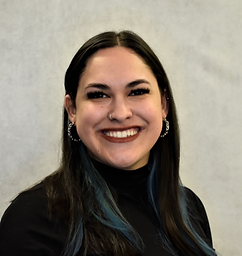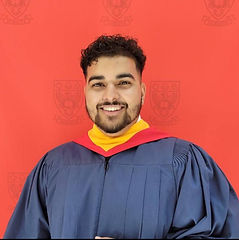SBN Online Research Symposium

SBN Online Research Symposium Committee
The SBN ORS is comprised of trainee researchers (graduate students, post-docs) across diverse behavioral neuroendocrinology labs. The ORS committee is overseen by the SBN membership committee including Dr. Matthew Paul (University at Buffalo), Dr. Wendy Saltzman (University of California, Riverside), Dr. Stephanie Correa (UCLA) and Dr. Damian Zuloaga (University at Albany).

Dr. Victoria (Tori) Riesgo (co-chair) (she/her) is a first year postdoctoral research fellow in the Cuarenta Lab at the University of Michigan. She graduated from California State University, San Marcos with a B.A. in Psychology in 2019, where she studied the influence of neuropeptides on rodent maternal behavior in the D’Anna-Hernandez lab. Upon joining the lab of Dr. Jari Willing at Bowling Green State University, Tori began work investigating the effects of two common environmental factors, endocrine-disrupting phthalates and maternal infection, on neurodevelopment. Tori’s dissertation research focused on pubertal hormones and their role in shaping the development of the neurons in the rat midbrain, identifying that pubertal onset shapes perineuronal net formation in the ventral tegmental area.. She is passionate about student mentorship and as a Chicana first-generation academic, she is dedicated to increasing accessibility and inclusivity within neuroscience, guiding similarly under-represented learners through the landscape of higher education with the goal of increasing retention and academic success.

Laila Ouldibbat (co-chair) (she/her) is a sixth-year PhD candidate in the Kundakovic Lab at Fordham University in New York. The Kundakovic lab focuses on the epigenetic basis of behavior and psychiatric disorders, with an emphasis on hormonal and environmental factors driving sex differences. Upon joining, Laila began a new research project investigating ovarian hormone mediated metabolic function in the adult female hypothalamus and the transcriptional mechanisms through which ovarian hormones can alter gene expression. Her work explores the molecular basis of hormone action on the female brain and behavior, aiming to help close the gender gap in science and advance women’s health research. As a Clare Boothe Luce Women in STEM Fellow, Laila is deeply committed to fostering inclusive and supportive environments in STEM, advocating for greater representation and empowering the next generation of diverse scientists.

Dr. Alyse Maksimoski (secretary) (she/they) is an NSF Postdoctoral Fellow in Dr. Devaleena Pradhan’s lab at Idaho State University studying the neuroendocrinology of naturally occurring protandrous (male to female) sex change in bluebanded gobies. Dr. Maksimoski graduated from Michigan State University in 2017 with a Bachelors in Zoology. During her undergraduate and postbac experience, she studied the social behaviors of honeybees, spotted hyenas, North American rodents, and kinda baboons. Dr. Maksimoski earned a doctorate training under Dr. Lauren Riters’ at the University of Wisconsin-Madison quantifying the neurobiology of individual differences in social valence in European starlings. Dr. Maksimoski then transitioned to Idaho State University to work under Dr. Lizbeth de la Cruz studying the impacts of aging in mice on sympathetic innervation of pancreatic islets before beginning her current position with Dr. Pradhan in the spring of 2025. She has consistently made representation and retention of women and underrepresented students a priority, many of whom garner authorship on posters and publications and are now graduate students themselves. Dr. Maksimoski is a 2024 SBN Elsevier Award recipient and has served on the ORS Committee since 2024.

Dr. Emily Wright is a postdoctoral fellow in the lab of Dr. Lin Tian at the Max Planck Florida Institute for Neuroscience. She completed her undergraduate studies at UC Davis, where she fell in love with neuroendocrinology as a research assistant in the lab of Dr. Karen Bales. She continued her academic journey at UC Davis, where she pursued her doctoral studies under the mentorship of Dr. Brian Trainor. Dr. Wright's dissertation work identified puberty as an important organizational period for testosterone to reduce both behavioral and neuronal responses to social stress in adult male California mice. Her current research employs the genetically-encoded serotonin indicator, iSeroSnFR2.0, to understand how antidepressant drugs modulate endogenous serotonin release during freely moving behavior. Dr. Wright is deeply committed to fostering a supportive and inclusive environment in the scientific community, especially for trainees. She also recognizes the importance of making scientific events accessible to those who have barriers to travel. Inspired by the exceptional mentorship she received early in her career, she prioritizes mentorship both within and outside of the lab.

Aaron Fleischer is an eighth-year graduate student in the Frick lab at the University of Wisconsin-Milwaukee. Aaron graduated with degrees in biology and chemistry from the University of South Dakota in the spring of 2018 and joined Karyn Frick’s lab in the summer of the same year. Broadly, the Frick lab studies how estrogens drive memory processes in mice of both sexes, with special, recent emphasis being given to Alzheimer’s disease models and developing novel treatments for the menopausal loss of circulating estrogens. Aaron completed his master’s thesis in the spring of 2021, where he developed a long-term treatment regimen and behavioral battery to test the efficacy of a highly selective estrogen receptor beta agonist in reducing preclinical indices of menopause-related symptoms in ovariectomized mice. Currently, Aaron is pursuing his dissertation, examining how estrogenic signaling builds upon learning-induced cellular activity to stabilize learned experiences into long-term memory within different hippocampal cell types. Aaron is particularly interested in sex comparisons regarding the roles estrogens play in facilitating memory processes. Importantly, this work has involved many undergraduate research assistants and postbaccalaureate researchers, resulting in many locally and nationally presented posters and talks given by rising scientists from the UWM community. Thus, Aaron is impassioned by mentoring students to find their scientific passions and working with others to facilitate the field’s neurobiological understanding of sex comparisons in learning and memory.

Sophia Rogers is a fifth-year PhD candidate in the Bales Lab at the University of California, Davis (UCD), where the lab focuses on the comparative neurobiology of monogamy and pair-bonding. She graduated in 2021 from the University of California, Riverside with a B.S. in Biology and transitioned directly into her graduate program at UCD. Her research interests include pair-bonding, adult social relationships, and the effects of prenatal conditions. Her current project investigates the behavioral consequences of prenatal THC exposure in prairie voles. Sophia is passionate about inspiring young girls to pursue careers in science, just as she was motivated by strong female scientists during her own journey. She is dedicated to mentoring students and working to close the gender gap in academia. By promoting diversity, inclusion, and equal opportunities in STEM, Sophia strives to create a supportive environment where all young minds feel encouraged and empowered to explore higher education and scientific careers.

Dr. Brigitta Bonaldo is a Tenure-Track Researcher. She completed her undergraduate studies in Neurobiology at the University of Turin. During her undergraduate experience, she studied the role of the anti-inflammatory enzyme A20 in the neuropathology of Multiple Sclerosis. In 2017, she started her doctoral studies in the Neuroendocrinology lab under the mentorship of Professor Giancarlo Panzica at the University of Turin. Her PhD work evaluated the effects on the brain and behavior of oral exposure to bisphenols A or S during critical periods of development. She was particularly interested in studying the possible impairments in maternal, sexual, and anxiety-related behaviors. In October 2023, she started a new postdoc fellowship in the lab of Dr. Stefano Espinoza at the University of Piemonte Orientale in collaboration with the University of Trento and the Istituto Italiano di Tecnologia (IIT) of Genoa, supported by the Simons Foundation Autism Research Initiative (SFARI). The main aim of her current project is to provide Proof-of-Concept for developing a novel RNA-based therapy for autism spectrum disorders (ASD). Even though ASD is a behaviorally defined disorder with a strong sexually dimorphic component, the behavioral phenotype and the sexual dimorphism in the transgenic models of ASD often represent critical points, as they could be mild, poorly described, or not considered; thus, she is now particularly interested in implementing the phenotyping of those aspects as key features to be considered when selecting an experimental model or testing new therapeutic approaches. She just moved to the University of Milan as a Tenure-Track Researcher. She fully supports the idea that science is sharing, which goes hand in hand with collaboration, accessibility, and inclusiveness.

Dr. Dario Aspesi is a postdoctoral fellow in the labs of Drs. Elliott Albers and Debra Bangasser at Georgia State University. He graduated from the University of Turin (Italy) in 2017 with an M.Sc. in Evolution of human and animal behavior. Under the supervision of Professor GianCarlo Panzica, Dario’s master’s thesis focused on the behavioral and neuroendocrine effects of neonatal stress on the onset of activity-based anorexia (ABA) in male and female rats. After graduation, Dario transferred to the University of Guelph (Canada) where he earned a Ph.D. in Psychology and Neuroscience in the laboratory of Dr. Elena Choleris. His PhD thesis focused on the rapid effects of sex steroids on cognition and aggression in male mice. Therefore, as a postdoc In Debra Bangasser’s lab, Dario aims to investigate the effects of the neonatal environment on the production of steroids in the brain (neurosteroidogenesis) and the behavioral implication of this interaction. He also works as a postdoc in Elliott Albers’ laboratory at GSU where he studies the modulation of neuroendocrine pathways by steroids in the regulation of social behaviors in hamsters. Dario’s career goals include becoming a principal investigator and developing his own line of research into how local steroid production in the brain is implicated in normal and abnormal behavior. Dario is passionate about fostering a more inclusive and diverse scientific community, with a particular commitment to supporting LGBTQIA individuals in science. He is dedicated to creating welcoming and equitable environments, advocating for greater representation, and empowering the next generation of diverse scientists to thrive in academia and beyond.

Christie Dionisos (she/her) is a 5th year Neuroscience PhD student in Dr. Peg McCarthy’s lab at the University of Maryland School of Medicine in Baltimore (UMB). Her dissertation research focuses on sex specific effects of gestational THC exposure on the developing amygdala, social play behavior, and maternal behavior. Christie received her B.S./B.A. from Union College in 2019, double majoring in Neuroscience and Gender, Sexuality, and Women’s studies. Her undergraduate thesis investigated the interplay between neurological sex differences and socially constructed enforcements of gender that shape society’s understanding of sex differences in the brain. Christie is the current president of the Neuroscience Outreach and Volunteer Association at UMB, which provides neuroscience exposure to grade school students in the Baltimore area with the hope of inspiring the next generation of scientists. She also is the host of the Neuro Networks podcast at UMB which highlights diverse perspectives within the local neuroscience community. Beyond her PhD, she hopes to become involved in science advocacy, bridging gaps between laboratory research and policymakers, highlighting the importance of sex and hormone-specific medicine.

Sunny Qureshi (he/him) is a 2nd year PhD Student in the Behavioural and Cognitive Neuroscience stream of the Department of Psychology at Brock University, supervised by Dr. Charlis Raineki and Dr. Paula Duarte Guterman. He holds a Bachelor's and Master's in Behavioural & Cognitive Neuroscience from Brock University. Sunny’s research investigates how prenatal alcohol exposure precipitates accelerated cognitive aging through dysregulated neuroimmune and neuroendocrine signalling, with a particular focus on sex‑specific vulnerability in rodent models. He aims to identify mechanistic biomarkers and inform targeted interventions for individuals with Fetal Alcohol Spectrum Disorders. Committed to mentorship and science outreach, Sunny has trained over a dozen undergraduate and graduate students in both behavioural neuroscience techniques and histological analyses. He also serves as a regional coordinator for the Canadian Brain Bee, inspiring the next generation of neuroscientists.
Former ORSC members
Dr. Krystyna Rybka, PhD (2024-2025)